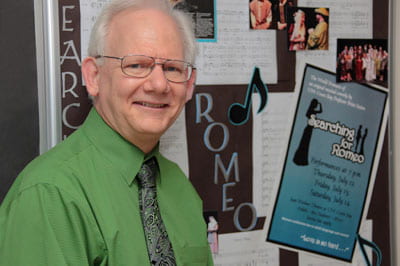 Brian Sutton isn’t a member of UW-Green Bay’s Theatre or Music faculty. He teaches English, but not creative writing. And yet Sutton has written, directed, produced and even performed in his own musical comedy, “Searching for Romeo,” with great success — and great University support.
Brian Sutton isn’t a member of UW-Green Bay’s Theatre or Music faculty. He teaches English, but not creative writing. And yet Sutton has written, directed, produced and even performed in his own musical comedy, “Searching for Romeo,” with great success — and great University support.
“I probably would have done this anyway, because it’s to some extent who I am,” said Sutton, associate professor of English and Humanistic Studies and director of the UW-Green Bay Writing Center. “But working at a school like this has made it a lot easier to get support in something like this. … The three areas you would logically think of for somebody who’s writing a musical comedy play — I’m not any of those. And yet I get a lot of support.”
Buoyed by that support, Sutton’s efforts this month will take him and his play all the way to New York City, where it will be performed as a staged reading during the New York Musical Theatre Festival. The support Sutton has received dovetails closely with UW-Green Bay’s interdisciplinary approach, which is now articulated better than ever through the University’s 360° of Learning brand. That approach exemplifies how UW-Green Bay encourages learning from multiple perspectives, giving students a full, 360° view of the world while giving them the experience they need to prepare for a successful career. UW-Green Bay’s top-notch faculty — including the award-winning Sutton — are a critical part of that equation.
“No literature happens in a vacuum,” Sutton said. “If you’re teaching, I don’t know, Dante, it’s not like Dante sprang out of nowhere. You need to know a certain amount about the Medieval Church, about the politics of the Italian city-state at the time, and so forth. … Theatre is literature and it is speech performance; it is all the technical fields; it is Psychology and so on and so forth. If it’s musical theatre, it’s also music.”
Sutton’s play, a comedy, is all of the above. His tale reimagines Shakespeare’s “Romeo and Juliet” from the perspective of the “losers” — Romeo’s former beloved, Rosaline; and Juliet’s rejected suitor, Paris. “Searching for Romeo” sold out all four shows — including a last-minute Saturday matinee — during its on-campus run last summer, and was widely acclaimed at the University and in the community. Sutton wrote the play, music and lyrics, produced the show and fronted the two-person “orchestra” of guitar and keyboard that provided accompaniment for the shows. He’s producing the New York production, which will stage two shows Friday, July 19 and one show Sunday, July 21 at The Studio at Theatre Row in Manhattan.
Sutton likes the comedic and musical elements of his play — his lyrics, he says, are better than his music — but perhaps his favorite element of “Searching for Romeo” is its different perspective.
“Romeo and Juliet is the most famous love story in history, and yet Romeo and Juliet themselves are spectacularly psychologically unhealthy,” Sutton said. “She’s 13 years old; there’s this negotiation that she will marry someone else; he thinks he’s in love with a woman named Rosaline. … They want to get married the night they met, after having spent maybe 15 minutes in each other’s company. They do get married the next day — the same day they get married, he kills her cousin.
“And (the lesson is) it’s probably much healthier to find somebody that’s just nice, reliable and so forth. … So I wrote a play about these two very normal people — not very exciting people — who are both dumped by the exciting people.”
“Searching for Romeo” blends traditional Shakespearean writing with contemporary script, providing an unusual, sometimes rhyming mash-up of styles. The play even puts a new twist on Shakespeare’s famous balcony scene, with Rosaline looking for Romeo during a party and stumbling into the scene — only to find out her love loves another.
“(Rosaline) wanders into the balcony scene,” Sutton said, “so that the most famous love scene in history becomes the vehicle by which my central character discovers she has been dumped — without being told in advance — in favor of her 13-year-old cousin.”
During last summer’s production, the scorned Rosaline and Paris were played by local couple Brandon and Joy Rockstroh. They have smaller parts this time around — but are nonetheless pleased to be part of the production.
“Three people in this production have done Broadway, and a lot of people have done first national tours and stuff like that,” Sutton said of his New York cast. “For (Brandon and Joy), this is like fantasy camp.”
Sutton will continue to revise “Searching for Romeo” up until the day of the first shows — and even after that. Audience reviews are part of the process, so he may end up changing some of the play between the second and third stagings. Sutton plans to submit his play again for the festival next year, hoping to secure a full performance this time. He also may send it — a “less R-rated version,” he says of the some-adult-content show — to publishers that work with high school theatre groups, both as a musical and a straight play. With references to seven other Shakespeare plays, Homer’s “Iliad,” Nathaniel Hawthorne’s “The Scarlet Letter” and more, it’s yet another chance to emphasize interdisciplinarity — and have a really good time doing it.
“It’s kind of fun to take traditional things,” Sutton said, “and put them on their head.”

